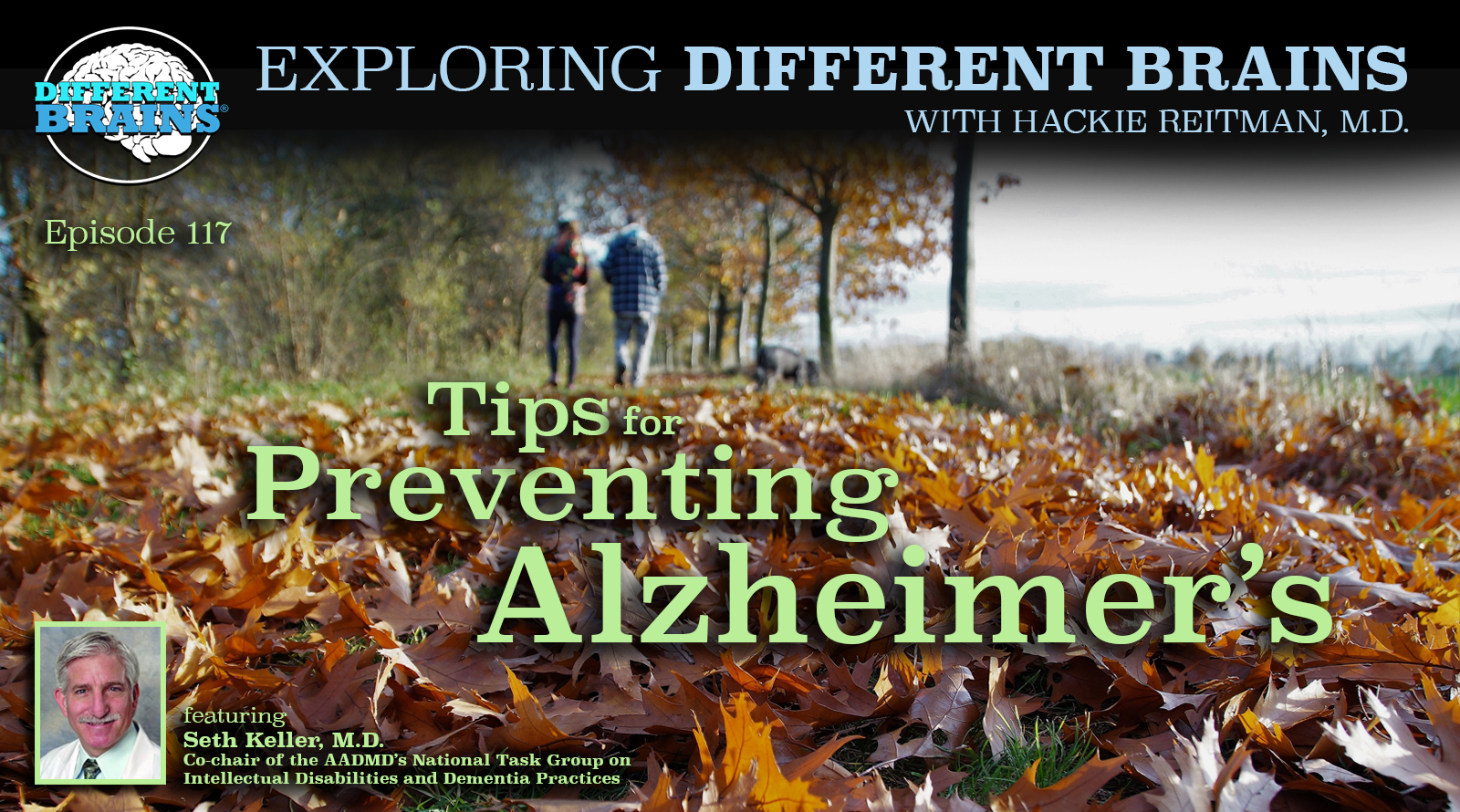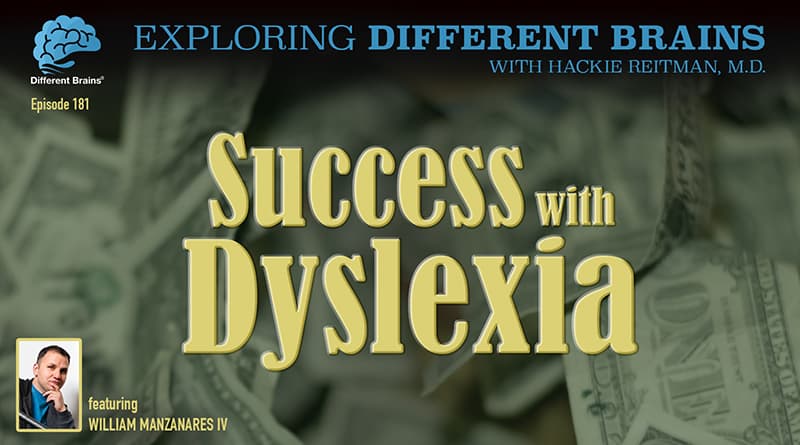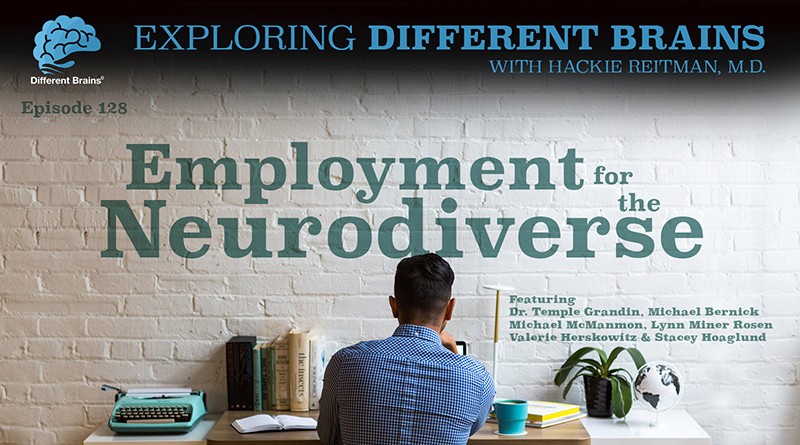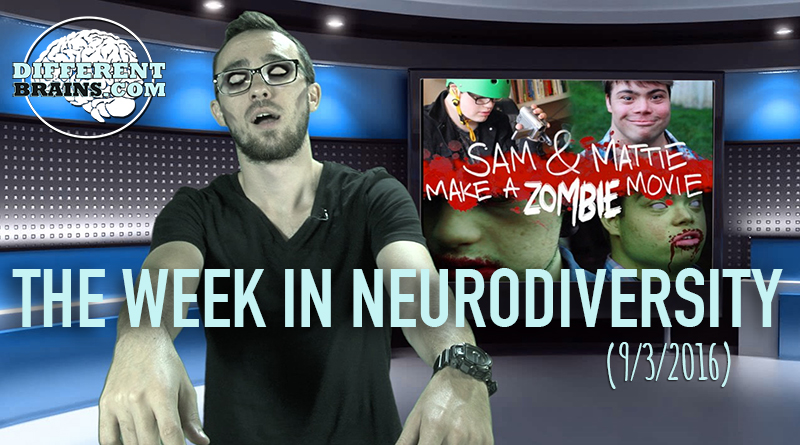
Tips for Preventing Alzheimer’s, with Seth Keller, M.D. of the AADMD | EDB 117
(19 mins) In this episode, Dr. Hackie Reitman continues his conversation with Seth Keller, M.D.. Dr. Keller is Co-Chair of the AADMD’s National Task Group on Intellectual Disabilities and Dementia Practices, the first neurologist elected president of the AADMD (American Academy of Developmental Medicine and Dentistry), as well as a member of the American Association on Intellectual and Developmental Disabilities and the Academy of Neurology. Seth offers some simple steps to help stave off Alzheimer’s and dementia, highlights the relationship between those conditions and Down syndrome, and discusses the importance of health care for individuals with intellectual and developmental differences.
FOR PART ONE OF OUR INTERVIEW WITH DR. KELLER, CLICK HERE
For more about Dr. Keller, visit: http://aadmd.org/
.
83 Second Preview:
.
To listen or download the podcast version of this episode, see the embedded player below.
Or look for us on your favorite podcast provider:
iTunes | Stitcher | SoundCloud
[expand title=”View Full Transcript”]
HACKIE REITMAN, M.D. (HR): Hi, I’m Dr. Hackie Reitman, welcome to another episode of Exploring Different Brains. Today we’re lucky to have, returning to us, our good friend, the wonderful neurologist Dr. Seth Keller. Seth, welcome to Different Brains.
SETH KELLER, M.D. (SK): Thank you, Hackie. It’s a pleasure being here and I, uhh, love the conversation, look forward to discuss all these wonderful things that you do and my colleagues and I do too, so thank you very much.
HR: I’m Joe Average Individual, 67 years old, and I want to prevent myself from developing Alzheimer’s, ok.
SK: Right, right.
HR: What are some of the simple tools that I can use that make sense for me to be doing.
SK: Well, it’s actually a marvelous question cause it really has a lot to do with health promotion. Promoting our health and allowing ourselves to age health-, in a healthy way, uhh, and it’s really everything that we do, starting at a young age to as we’re getting older to do just that, to be healthy when you’re older, and there’s no doubt that there’s a great growing science, Hackie, on, on the uhh, the brain health and things that absolutely can be done throughout our lifespan to really make ourselves uhh, uhh, well when we’re older, in, in our mind. And, and one thing really, basically is just keeping very socially active. There, there’s a lot of research that talks about people with interactions and conversations and reading and thinking through and keeping very busy is very good. And that is really working your mind. There’s a lot of research, a lot of studies, a lot of information that talks about that, which kind of parlays into what people talk about with word games, with sudoku, and other kinds of things. So that’s kind of really where a lot of that comes from about that, working things through. And one example is that what we do naturally in our lives to kind of keep ourselves going is right now, I’ll use an example, you just literally picked up a glass with your right hand, automatically and picked it up. So what that means is that you and probably you didn’t give it much thought, and here I got my glass too, so you’re basically have a pathway in your mind of what naturally you use, right handed or not, pick it up. So that’s a pathway that you have formed in your brain. So a way in which we talk to people, that I do, people trying to help their pathways in their brain stay healthy, is do things differently.
So, for instance, if you naturally always use your right hand to pick up your glass, try doing the opposite side. Do it and do that more regularly. That would be the same thing, say, brushing your teeth. If you naturally brush your teeth with one hand, work in the other side. You’re driving your car and you know naturally that you go one direction every time, next time maybe try a different way. So what that does is actually works our brain to learn and use other pathways and it exercises the brain in that fashion. That’s number one. Number two is what we, the way we treat our bodies has a big difference. So do we smoke cigarettes, do we get our blood pressure checked, do we eat well, do we not, our sugar, diabetes controlled, everything like that is huge in terms of brain health. People who have uncontrolled blood pressure problems absolutely have a much higher rate of cognitive brain dysfunction. People that smoke a lot, who have a risk of brain dysfunction because of that, absolutely. People end up having strokes, worsening memory problems, there’s no doubt that what we put in our bodies have-have-has impact. The way we exercise, so if you get your heart rate up on a semi-regular basis throughout your lifespan, and not waiting until you’re 56 years old. It’s not too late, of course, to do that, but try to do things throughout the lifespan which is really important for people to realize. “Why am I doing it now? Why am I putting this effort in now? Even though it makes me feel good?” You’re basically protecting yourself for later, and I guess that might be esoteric, you know, later in life I’m doing all this work now, 40 years before I get older, 30 years, 20 years, it really makes a difference. You know, for those who’re already that age and say, “Boy, I wish I did this,” but you know, you live, you learn from that. The key thing, Hackie, is how do you take someone and change their bad habits, or I hate to say lazy habits, and make them someone that does these things? How do you get someone to go on a, what we would call a health promotion program? That’s not an easy thing to do, especially in those with developmental disabilities, who sometimes need supports, and they need mentors, they need people to look at around them who sometimes may need to support them, be a good observer, uhh, and good role model. That’s something that’s very important, especially in those that have developmental disabilities, that, that, you know, go with families or direct supports.
HR: Well, you’ve just given us a natural segue into, you and I are both scheduled to be speaking at the 2018 NDSS Down Syndrome Adult Summit.
SK: Yes.
HR: The National Down Syndrome Society, uhh, which they do great work, and, umm, it’s amazing to me, the simple tools you just outlined, ok, the most underrated things, socialization, proper diet and nutrition, activity, exercise, and we can add other things if you can do it, get a good amount of sleep, get rid of some stress if you can. All of these tools do not cost a lot of money but require a certain degree of education for all of us to get this out. They work not only for your overall life expectancy and your quality of your life, not just for regarding preventing or improving Alzheimer’s, not just for autism, not just for Parkinson-ism, and the list goes on and on, not just for PTSD, anxiety, depression, bipolar, and that’s what we’re trying to do here under Different Brains’ umbrella, is to get all of it together and say, “Look, all of these different silos, let’s share our understanding. Let’s share our research.” Now, you speak very eloquently about the, umm, relationship between Down Syndrome and development of dementia and Alzheimer’s, and one of the reasons you are such an integral part, along with Steve Perlman and others, of the Special Olympics, which is changing these people’s lifestyle, by example, by providing a social and athletic and exercise and diet education and everything. Speak to your involvement with the development of this for this particular population.
SK: Umm, ok. Well, basically, I come at it from different perspectives. Umm, a little complicated. But the one main, the main one is that I’m the, uhh, in my so many titles I have and hats that I wear, umm, the co-chair of the national task group, you’re mentioning that, and that’s a big deal for me in my life. It’s called the National Task Group on Intellectual Disabilities and Dementia Practices and I’m the national co-chair alongside my colleague, Matthew Janicki. And Matthew Janicki, he’s my friend; he’s my mentor; he’s my partner; he’s been in the field of, of, of aging and developmental disabilities for quite a long time, so he and I had helped create the so-called National Task Group, which is essentially a group, a multi-disciplinary group, there are a lot of different people from different disciplines who are looking specifically at those with intellectual and developmental disabilities who are aging with a high risk and rate of developing early onset Alzheimer’s, which is basically Down Syndrome. People with Down Syndrome, because the genetic nature of what they have with extra chromosome 21, that extra chromosome 21 creates the accumulation of these abnormal proteins which are the glue in clogging up the brain, leading to Alzheimer’s disease. So in people with Down Syndrome, there’s a greater than 60% chance that by age 60, they already are developing Alzheimer’s disease. 60% chance by the time they’re 60 years old that they’ll have Alzheimer’s disease, which is terrible. They can even begin having it at 40 or 50 years old and these are people basically that have had some degree of lifelong disability because they have Down Syndrome who are, who are trying as hard as anything with their supports to live full lives and be valued in their lives. And they’re getting support and medicated by their family, by their parents, who they, as they age, getting older too.
So we’re not only helping and talking to people with Down Syndrome who’re facing these adversarial difficulties, but the support network too, who’s trying to care for them, because many years ago, not even that many years ago, Hackie, people with Down Syndrome never lived that long because they weren’t getting the quality of healthcare. So the issue of people with Down Syndrome even developing Alzheimer’s disease, in the 1980s, they really wouldn’t have thought much about it. 1980s, not that long ago. Now, in 2018, 2030, 2050, people, not just us who are baby boomers living longer and will be much like the United States over 65 a great amount, people with developmental disabilities, including Down Syndrome are going to live longer, however, because of the early onset of Alzheimer’s, it’s a huge problem, obviously for them, Alzheimer’s is really a terminal illness, so my group, much of that. And health promotion is huge. So I’ve been partnering with Special Olympics. So the aspect in entirety of Special Olympics is that. And Special Olympics is really, G-d bless Special Olympics, is an organization that is really about younger people, sometimes higher level functioning people, who’re acting well in competition with their families ans supports. But the, the average age of people in Special Olympics in the United States is early 20s. Those that are in their 30s, 40s, 50s, and beyond, even though they’re living, many cases they, they have not, they’ve either dropped out of Special Olympics or not part of Special Olympics, and those that are aging in Special Olympics, the information about age and the impact of age upon them is not known. It’s not looked at.
So the focus that I have, National Task Group, Special Olympics, is trying to bring the awareness of age with an organization like Special Olympics to look at aging athletes, senior athlete is the moniker I’ll use, senior athlete, and so I’m working with various states, Hackie, I worked specifically with the states, specifically Alaska, so my good friend and colleague, Jim Balamaci is the executive director of Special Olympics Alaska. I’ve gone up to Anchorage; we’ve talked in a summit, an aging summit; they talk about community provider agencies; they look at family members; they do a holistic approach, not only within Special Olympics that changes what they do, but trying to change how they can focus on why do people drop out of Special Olympics, what’s inherent in why they’re not staying in. It’s not all health issues, but if they stay in and they develop the problems of health-related problems due to Alzheimer’s and other ones, what does Special Olympics do? What can they do more than they might do now to make the effects of aging, Alzheimer’s disease easier on them and their family, to enable them to continue with maybe not competition, per se, but maybe health promotive factors. Exercise, socialization, those two you talked about, that’s where, really, they need to be. And that’s where I’m at in my work with them. I also work in AADMD, American Academy of Developmental Medicine and Dentistry, a big word, where I work my healthcare providers. My healthcare providers, the neurologists, the physicians, who, too, need to appreciate aging. Aging, again, decades ago, we weren’t thinking about it. In the United States, Hackie, here I get on my soapbox, in the United States, much of what’s been done by our government to support people with developmental disabilities focuses much more on maternal fetal health, meaning that the mother that’s pregnant, keep her well, the baby that’s born, try to make sure they live. The focus on adults, and aging adults in particular, wasn’t done. So there hasn’t been a lot of research; there’s not a lot of funding, so across the United States now, even the concept of just aging in developmental populations is still barren. It still needs to be worked on, but it requires funding, support, and awareness, and these are things that we try to chop at and grow.
HR: You know, we’ve inadvertently, it’s been all about, let’s say for instance, in autism, oh it’s all about the little kids. Well, the kids grow up into adults. They need jobs; they need to learn skills; they need to maximize potential.
SK: Right.
HR: Whether it’s Down Syndrome or autism or cerebral palsy and the list goes on and on, it’s the spectrum of life.
SK: And our phases change. The spectrum of life is huge, because certainly, things are different as you’re aging. I mean, whether you’re an infant, a child, adolescent, young adult, older adult, senior adult, each phase of your life is a phase. And with that phase comes changes both for you and those around you and just, and there shouldn’t be a, a bias and negative stereotype, but, but really it is is that people that are younger may look at older people in a, you know, in a negative way, because they might look down upon them or less respect for them or maybe subconsciously they don’t want to be there, “I don’t want to get older, therefore I can negate it.” But really, what it is is that when people are now living longer in the United States, uhh, there’s no doubt that as we get older and move from one phase into the later phase of life, it’s going to be different, the perception, even for us. We are going to have a higher expectation that we want equal rights, equal say, and we’re healthy enough, or we should deserve these kinds of things. Because before, the stereotype of an old person is someone oh, they’re useless, they don’t have value, they’re out there, they’re so called retired in life, and to me that adds negative skepticism or stereotypes towards them, but it’s foolish, and I think it’s going to change as people are living longer and right now, I’m 56 years old, so when I’m 66, G-d willing, 76, I’m, hopefully I’m going to be just a little crinkly in my life, but I’m basically going to want to still be very active and really get respect in hopefully what I do. So I think you’re going to see a cultural change, more and more, through generations. I really do.
HR: Well, that’s very encouraging.
SK: I do believe it. You’re seeing it now, you’re seeing it now.
HR: Dr. Seth Keller, what have we not covered that you would like to cover today?
SK: Hmm. Well, I, there’s, there’s no doubt that one thing that I care a lot about is education and training for physicians. So much of what I do is trying to get the word out to my brethren in neurology and healthcare to try to put the emphasis that people with developmental disabilities have value. There’s really what it is in a lot that I do, is try to bring the awareness of the people, developmental disabilities have rights, and therefore with rights, they should deserve good healthcare. But to have good healthcare, there has to be training to practitioners, so, so really my feeling, and a lot of that in what I do is not only providing a service that I personally could do, but spread the wealth. Let others also be able to help out. It’s, it’s, we’re a small core group. The reality of my colleagues to provide this service of specialty care, we’re actually very small. So when you look at people around the United States, if there’s not a Seth Keller in all these different states or other people like me, so what do they do? Where do they get their specialized neurologic care? Well, the reality is they may not get it, Hackie. So therefore, the reality and the long term way is to provide further education and training and awareness, maybe not all specialists will become specialists in developmental disabilities, but it goes to basis of caring for people who are different. Right, Hackie? People are different, and therefore they deserve the right, like anybody else, to be listened to, appreciated, and be valued, and therefore for me to care about them as an individual and therefore me give them every benefit of helping them care for their health. But if you can’t relate to them, and you cannot appreciate them as people who have value, doesn’t go far. Doesn’t go far. So that’s kind of where, I think, the bottom line is: caring for people as people, no matter how different they may be.
HR: Seth, before we leave, tell our audience: If they want to learn more or get in touch with you, how do they do so?
SK: Absolutely. The best way to find out about the work that I do and get in touch with me is through my national organization, the American Academy of Developmental Medicine and Dentistry, and our website is aadmd.org. So that would really be the best way to find me and get information.
HR: Dr. Seth Keller, it’s been a pleasure to have you return, yet once again. Thank you for being with us and enlightening our audience here at Different Brains. Thank you so much.
SK: It was a pleasure being with you; I appreciate really providing me the opportunity to discuss all these really important issues, so again, thank you for all that you do.
[/expand]
.




